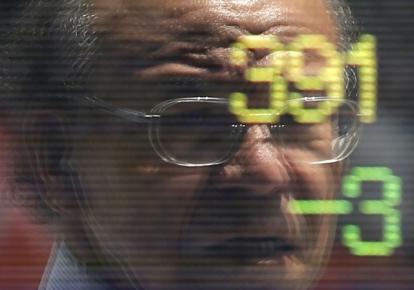Asia Shares Worn Down by Wall St, Oil Near 9-Mth Low
Bareksa • 06 Aug 2014

A man is reflected in an electronic stock quotation board outside a brokerage in Tokyo July 14, 2014 - (REUTERS/Issei Kato)
Losses were moderate, with Japan's Topix off 0.6 percent, as was the Nikkei.
Bareksa.com - Asian stocks slipped on Wednesday while the U.S. dollar held firm after a slump on Wall Street and tensions over Ukraine instilled a mood of risk aversion across markets.
Geopolitical concerns overshadowed upbeat U.S. economic data which included a spike in service-sector activity to a nine-year peak and a surprisingly large increase in factory orders.
Yet there was potentially positive news for the global economic outlook as oil prices continued their slide, with Brent crude hitting its lowest in nine months.
Higher energy prices essentially act as a tax on consumers and businesses, so the drop should give a fillip to spending power and demand.
For now, the drag from Wall Street was too much for regional markets and MSCI's broadest index of Asia-Pacific shares outside Japan slipped 0.2 percent.
Losses were moderate, with Japan's Topix off 0.6 percent, as was the Nikkei.
The Dow had dropped 0.84 percent, while the S&P 500 lost 0.97 percent and the Nasdaq 0.71 percent. All 10 S&P 500 sectors ended lower, led by energy stocks, which shed 2.1 percent as ample supply pressured oil prices.
Shares had been weak for most of the Tuesday session, but selling accelerated in the afternoon on reports that Russian troops were massing near the Ukraine border.
Shortly after the close, Twenty-First Century Fox, the media company controlled by Rupert Murdoch, said it had withdrawn its offer to buy Time Warner Inc.
Shares of Fox jumped, gaining 8.6 percent in after-hours action, while Time Warner shares fell over 11 percent.
There were also reports Sprint Corp had dropped its bid to acquire No. 4 U.S. carrier T-Mobile U.S. Inc because of regulatory obstacles. Sprint's shares slid 11 percent after hours, while T-Mobile lost 8 percent.
The unease over Ukraine helped put a mild bid into Treasuries, with yields on 10-year notes down a tick at 2.49 percent.
In currencies, the dollar hit its highest against a basket of currencies since last September after the Institute for Supply Management said service-sector growth hit an eight-and-a-half-year peak on strength in new orders and employment.
U.S. factory orders were also solid in July and data showed positive revisions to durable goods orders, a sign that the economy continues to improve.
The dollar index was last at 81.537, not far from the overnight peak of 81.626. The euro languished at $1.3370, having plumbed a nine-month trough of $1.3358.
The dollar had less luck on the yen, lapsing back to 102.54 from Tuesday's high of 102.93.
The standout currency was the New Zealand dollar, which skidded to two-month lows overnight after milk prices fell again at an auction held by Fonterra Co-operative Group, the world's biggest dairy exporter.
In commodities, gold failed to get any lift from safe-haven flows and idled at $1,288.14 an ounce.
Oil prices remained under pressure as ample supplies in Europe and North America outweighed fears that violence in the Middle East and North Africa could disrupt production.
Brent crude edged up 20 cents on Wednesday to $104.81, but that followed its weakest close since November 2013. U.S. crude was 30 cents firmer at $97.68, following its lowest settlement since early February. (Source : Reuters)